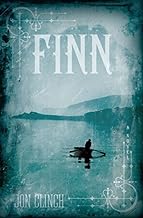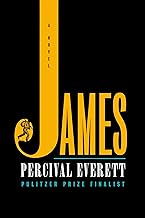Jon Clinch’s Finn (2007) and Percival Everett’s James (2024)
When US novels lose copyright protection, certain contemporary writers decide to re-write or enhance some of these works. Michael Farris Smith, for example in Nick (2021), created a “back story” for Nick Carraway from The Great Gatsby). An earlier example is Jon Clinch’s Finn, a recreation of Huckleberry Finn’s despicable father. A recent and more successful novel also has its genesis in Mark Twain’s novel. Earlier this year Percival Everett published James, a recreation of Huckleberry Finn with the slave Jim as narrator and central character. The result is a brilliant tour-de-force that mirrors the original in some respects and transcends it in others. Both Finn and James prove that a brilliant original can beget equally fascinating literary offspring.

Jon Clinch, a native of New York and a graduate of Syracuse University, published Finn, as his first novel, in 2007. The Washington Post called it one of the best novels of the year, and it was a finalist for the Center For fiction First Novel Prize. Since then, Clinch has published three more novels: Kings of the Earth (2010), Marley (2019), and The General and Julia (2023).
Clinch’s Finn offers an intensely evil version of Mark Twain’s Pap Finn. A violent drunkard, Clinch’s Finn is the epitome of the bad parent, hardly a father at all to Huck, whom he shares with Mary, the Black women he has trapped into long term, marital slavery. Clinch’s Finn has little affection for his mulatto son, partly because he, like Twain’s Finn, holds the racial prejudice of the white underclass. Finn’s main characteristic, as depicted by Clinch, is an almost pathological addiction to violence. He abets an evil pedophile who abducts, sodomizes, and kills a young boy and then his father. Later Finn chokes and drowns the pervert and kills yet another old man. Reviewer Ron Powers identifies Cormac McCarthy’s contribution to Clinch’s evil Finn: “. . . the universe Pap Finn has landed in is ruled not by Mark Twain but by Cormac McCarthy, whose influence saturates Finn.”
Clinch’s Finn has a totally different family background from that of Mark Twain’s Finn. He is the son of a local judge whose prejudice against blacks is so extreme that he ultimately orders Finn to kill Huck to clear the family’s “bloodline.” An obvious outcast, Finn does everything in his power to dishonor his family and, like Mark Twain’s Pap Finn, he gets the punishment he deserves
Percival Everett, a native of Georgia who grew up in South Carolina, has been writing novels since the mid-1980s. After graduating from the University of Miami and earning an M. A. Degree in fiction from Boston University, he moved West. He currently lives in Los Angeles with his wife, Danzy Senna, also a novelist. A prolific writer, Everett has published more than twenty books (mostly novels), several short story collections, volumes of poetry, and a children’s book. In much of his fiction, Everett has satirized American society, particularly its treatment of Black Americans. Ahead of James, Everett’s best known novel is probably Erasure (2001), his satire of book publishing and its use of racial stereotypes to sell popular culture. Erasure became the basis for the Oscar-nominated film, American Fiction (2023).

Percival Everett in James creates a novel different from both Finn and Huckleberry Finn. Turning the table on Mark Twain, Everett makes James the narrator the novel. He tells, in the first two books, much of the same story as Mark Twain told, but from a totally different perspective. Separated from Huck, his knowledge of Huck’s episodes is realistically thin. James, a brilliant man with strong family ties, is determined to free himself and his family from slavery. He, like the real-life Frederick Douglass, has taught himself to read. Having encountered a wide variety of books in Judge Thacker’s library; he carries on internal conversations with Rousseau, Voltaire, and John Locke, often on the subject of slavery. James become a writer himself, having stole a notebook where he records his thoughts with the pencil another slave grabs for him. That thief later is lynched for the “theft.”
James’s attitude toward Huck is both protective and hostile, for Huck can identify as white and reap the advantages of white superiority. James resents Huck’s condescension revealed in the first lines of the novel: “Those little bastards were hiding out in the tall grass. . . .They were always playing some kind of pretending game where I was either villain or prey, but certainly their toy.” Still, Everett’s depiction of Huck’s sensibility is similar to that of Mark Twain. Everett’s Huck intuits the evil of slavery, and his awareness come earlier than that of Mark Twain’s Huck, who matures in understanding as he learns to accept Jim as an equal.
Everett’s handling of language is the most interesting feature of the novel. James narrates his story in the language of a literate educated person. The heavy dialect he speaks is a creation meant to meet the racist expectations of the white community. James teaches his daughter and other Black children the required/expected dialect as a means of self-protection. Everett’s switch in language seems to be his way of pointing out the essential humanity of his Black characters—their existential equality with their White oppressors. Dwight Garner writes, “Everett, like Twain, is a master of American argot; he is the code switcher’s code switcher. In ‘James,’ he puts his skills to incandescent use.” Reviewer Ron Charles evaluates the novel by noting its contemporary relevance: “What better moment for one of the nation’s preeminent authors to reconceive the nation’s central Novel?” For anybody who admires The Adventures of Huckleberry Finn, both Clinch’s Finn and Everett’s James are essential reading.
































